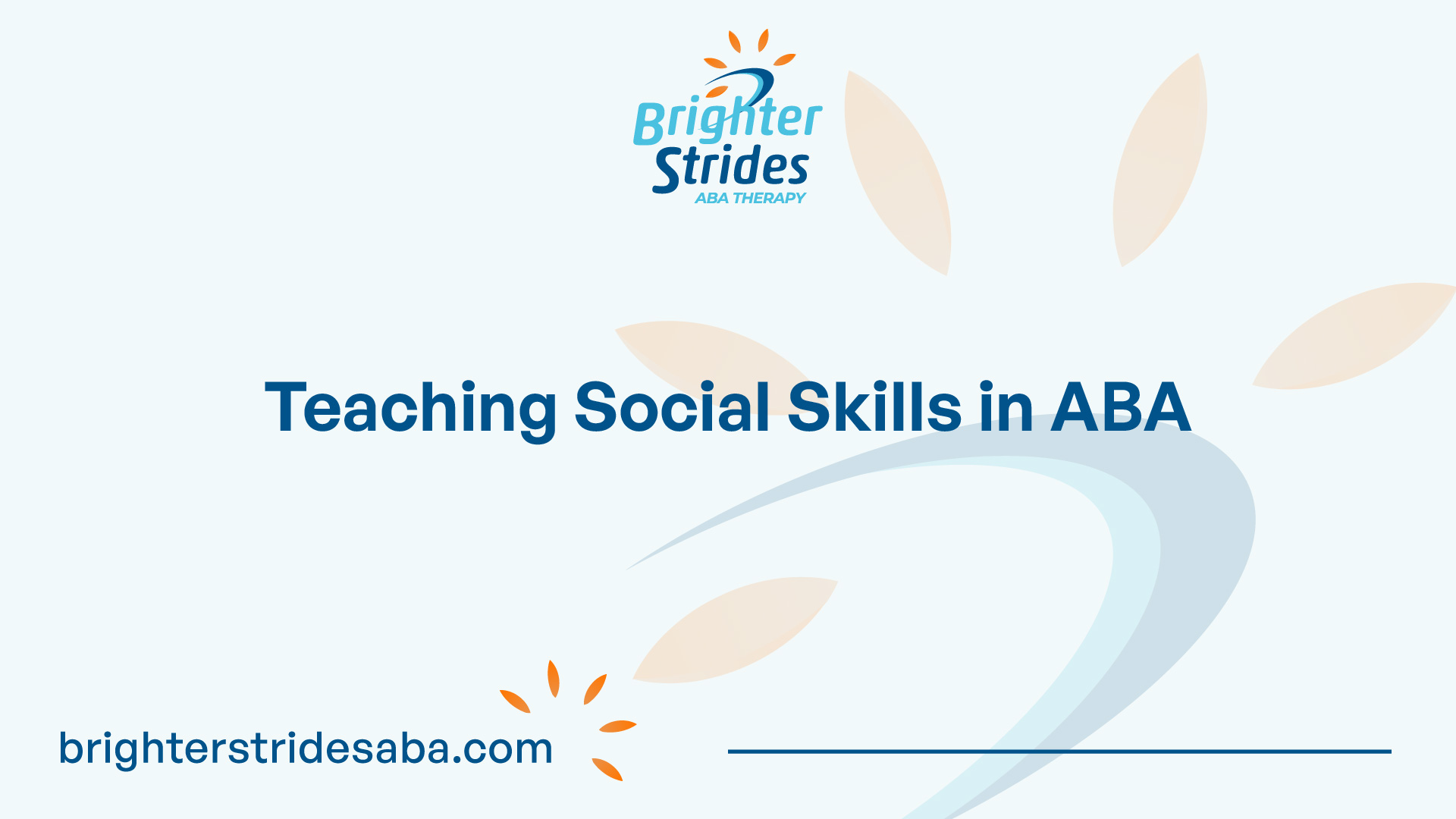
Understanding ABA Skill Acquisition
Skill acquisition plays a pivotal role in applied behavior analysis (ABA) therapy, a scientifically validated approach to understanding and modifying behavior. ABA focuses on breaking down complex skills into smaller, manageable steps and systematically teaching and reinforcing them. By targeting specific areas of development, skill acquisition programs aim to promote functional independence and enhance overall quality of life.
Importance of Skill Acquisition
Skill acquisition programs in ABA therapy are crucial for building independence, problem-solving skills, creativity, and reducing maladaptive behavior in learners. These programs provide individuals with the tools and strategies needed to effectively navigate various situations and environments. By systematically teaching and reinforcing skills, ABA therapy helps individuals develop the necessary abilities to engage in meaningful interactions and successfully navigate daily life.
Skill acquisition is especially important for individuals with developmental or behavioral challenges. ABA therapy provides a structured framework for teaching essential skills necessary for their daily functioning and overall well-being. Through targeted interventions, individuals can learn to communicate effectively, engage in social interactions, acquire daily living skills, excel academically, and develop vocational skills. These skills empower individuals to reach their full potential and lead more independent and fulfilling lives.
Target Areas in Skill Acquisition
Skill acquisition programs in ABA therapy encompass various skills across different domains, all aimed at enhancing independence and overall quality of life [2]. Some of the commonly targeted areas include:
- Communication Abilities: ABA therapy focuses on developing and improving communication skills, including expressive language, receptive language, and social communication. This includes teaching individuals to effectively express their needs, understand and follow instructions, engage in conversation, and use appropriate social cues.
- Social Interactions: ABA therapy aims to enhance social interaction skills, enabling individuals to participate in social activities, develop and maintain friendships, and navigate social situations. This includes teaching skills such as turn-taking, sharing, perspective-taking, and understanding social norms.
- Daily Living Skills: ABA therapy helps individuals acquire essential daily living skills, such as personal hygiene, dressing, meal preparation, and household chores. These skills promote independence and self-sufficiency in everyday life.
- Academic Skills: ABA therapy can support the development of academic skills, including reading, writing, math, problem-solving, and critical thinking. By breaking down complex academic tasks into smaller, manageable steps, individuals can acquire the foundational skills necessary for academic success.
- Vocational Skills: For individuals transitioning to adulthood, ABA therapy can focus on developing vocational skills that prepare them for employment. This may include skills such as resume building, job search techniques, interview skills, and workplace behavior.
By targeting these areas in skill acquisition programs, ABA therapy aims to equip individuals with the necessary skills to navigate various aspects of their lives successfully. These programs are tailored to individual needs, providing personalized interventions and support to maximize each individual’s potential for growth and independence.
As skill acquisition is a fundamental component of ABA therapy, it is essential to understand the key components of ABA programs and how they contribute to the overall success of skill development. In the following sections, we will delve into the key components of ABA programs, the implementation of skill acquisition plans, teaching social skills, monitoring progress, and the role of professionals in ABA therapy.

Key Components of ABA Programs
When it comes to ABA (Applied Behavior Analysis) programs, there are several key components that play a crucial role in skill acquisition. These components focus on developing play skills, building communication skills, and providing social interaction training.
Play Skills Development
Play skills are not only enjoyable for children but also serve as a fundamental aspect of their development. Through play, children learn problem-solving skills, expand their social interactions, and reduce challenging behavior [1]. ABA programs recognize the importance of play skills and incorporate play-based interventions to facilitate learning.
In ABA, play skills development involves creating opportunities for structured and purposeful play. Trained professionals utilize various techniques, such as modeling, prompting, and reinforcement, to teach children appropriate play behaviors. By targeting specific play skills, children can enhance their cognitive abilities, social interactions, and overall development.
Communication Skill Building
Communication skills are essential for human interaction and development. Many learners who enter ABA services may lack adequate communication skills, making it crucial to address this area [1]. ABA programs employ evidence-based strategies to assess and develop effective communication skills in learners.
Through a comprehensive assessment, professionals identify the individual’s communication strengths and areas for improvement. Using ABA principles, such as reinforcement and shaping, communication skills are systematically taught and reinforced. This may involve teaching functional communication, expressive language, receptive language, and social communication skills.
By focusing on communication skill building, ABA programs empower individuals to effectively express their needs, desires, and thoughts, improving their overall quality of life and social interactions.
Social Interaction Training
Social skills are crucial for individuals to navigate social environments successfully. ABA programs recognize the importance of teaching a wide range of social skills, including conversation skills, personal space, hygiene, life skills, and community-based skills [3]. These skills are tailored to individual learners’ goals and are taught in a systematic and structured manner.
ABA social skills programs break down complex social skills into smaller components to ensure effective teaching and understanding. Professionals utilize techniques like modeling, role-playing, prompting, and reinforcement to facilitate skill acquisition. By systematically teaching social skills, ABA programs promote the development of friendships, inclusion in classrooms, and integration into communities.
One popular ABA technique used for teaching social skills is Behavioral Skills Training (BST). BST involves explaining the importance of the skill, modeling the skill, practicing together, and providing feedback [3]. This systematic approach ensures that learners acquire and generalize social skills effectively.
By incorporating play skills development, communication skill building, and social interaction training, ABA programs equip individuals with the necessary skills to thrive in various social settings and enhance their overall quality of life. The systematic and evidence-based approach of ABA ensures that individuals receive targeted interventions tailored to their unique needs and goals.
Read more about: ABA Therapy Benefits
Implementing Skill Acquisition Plans
Implementing skill acquisition plans is a crucial step in Applied Behavior Analysis (ABA) therapy. This process involves several key components, including assessment and curriculum selection, collaboration for effective interventions, and behavior analysis techniques.
Assessment and Curriculum Selection
Before creating a skill acquisition plan, it is essential to conduct thorough assessments to identify the strengths and deficits of the individual receiving ABA therapy. Assessments help determine the specific skills that need to be targeted for intervention. For example, Dr. Brown-Davis selects the Essential for Living (EFL) assessment and curriculum for Jada, an elementary school student with Level 3 Autism Spectrum Disorder and a severe Intellectual Disability. They focus on meaningful skills such as requesting help, communicating biological needs, and stating preferences [4].
Collaboration with other professionals, such as school psychologists or educators, can also be beneficial in identifying the academic strengths and weaknesses of an individual. This collaboration ensures that the intervention plan aligns with the individual’s needs. For example, Ms. Bailey collaborates with the School Psychologist to identify Donovan’s academic strengths and weaknesses. They find that he is capable of grade-level work in math but has many missing skills in literacy. Based on this information, they select a phonics-heavy intervention to address his literacy skill deficits [4].
Collaboration for Effective Interventions
Implementing skill acquisition plans requires collaboration among the professionals involved in the individual’s care. This collaboration ensures that interventions are consistent across different settings and maximizes the effectiveness of the therapy. The professionals work together to develop strategies and techniques that align with the individual’s goals.
Behavior analysis techniques play a crucial role in effective interventions. These techniques involve identifying the antecedents and consequences of behaviors and using reinforcement and prompting methods to teach new skills. Behavior analysts utilize a variety of techniques, such as discrete trial training, naturalistic teaching, and task analysis, to facilitate skill acquisition. The specific techniques used depend on the individual’s needs and goals. For more information on ABA therapy techniques, you can refer to our article on ABA therapy techniques.
Monitoring Progress in ABA Programs
Monitoring progress is a vital aspect of implementing skill acquisition plans in ABA therapy. Data collection and analysis are essential in measuring the effectiveness of interventions and making informed decisions about adjustments and future planning. Professionals collect data by directly observing and measuring behavior in real-life settings. They may use both indirect assessments, such as interviews and surveys, and direct assessments, such as direct observation.
To ensure accuracy and streamline data collection, professionals can utilize specialized platforms like ABA Matrix. These platforms facilitate comprehensive reporting, automate data collection, and enable professionals to document skill acquisition and measure outcomes. This data-driven approach allows for evidence-based decision-making and helps professionals track progress over time. For more information on behavior tracking and data collection in ABA, you can refer to our article on ABA behavior tracking.
By implementing skill acquisition plans in ABA therapy, professionals can effectively target and teach specific skills to individuals. Through assessments, collaboration, behavior analysis techniques, and progress monitoring, ABA therapy aims to unleash the potential of individuals and help them achieve meaningful and functional outcomes.

Teaching Social Skills in ABA
In Applied Behavior Analysis (ABA), teaching social skills is a vital component of skill acquisition programs. ABA can effectively teach a wide range of social skills, including conversation skills, personal space, hygiene, life skills, and community-based skills, tailored to individual learners’ goals [3]. By focusing on social skill development, individuals can enhance their ability to interact with others, build relationships, and navigate social situations with confidence.
Social Skills Importance
Social skills play a crucial role in our daily lives. They enable us to communicate effectively, establish meaningful connections, and navigate social environments. For individuals with developmental delays or challenges, such as those with autism spectrum disorder (ASD), learning social skills through ABA can be transformative. ABA programs systematically break down complex social skills into smaller components, making them easier to understand and learn. By targeting specific social skill deficits, individuals can develop the necessary skills to foster friendships and inclusion in classrooms and communities.
Behavioral Skills Training
Behavioral Skills Training (BST) is commonly used in ABA to teach social skills. This evidence-based approach involves a structured process that includes explaining the importance of the skill, modeling the skill, practicing together, and providing feedback [3]. BST promotes active learning, allowing individuals to observe, imitate, and practice social skills in a supportive environment.
During BST sessions, individuals are initially taught the rationale behind the targeted social skill. This helps them understand why the skill is important and motivates them to learn and apply it in real-life situations. Following the explanation, the skill is demonstrated through modeling, allowing individuals to observe the desired behavior in action. Next, individuals engage in guided practice, where they actively participate in role-playing scenarios or structured activities to practice the skill. Feedback is provided throughout the process to reinforce correct responses, provide correction when needed, and ensure mastery of the targeted social skill.
Measurement of behavioral objectives is crucial in ABA programs to determine the effectiveness of teaching social skills. Data is collected before, during, and after the teaching process to assess changes in target behaviors. This data-driven approach allows behavior analysts to track progress, make necessary adjustments to teaching strategies, and ensure the acquisition of social skills.
Pre-and post-assessments are essential in ABA to track progress in teaching social skills. These assessments focus on observable and measurable behaviors, providing a baseline measure of the individual’s skill level before intervention. By tailoring assessments to individual learners, behavior analysts can design targeted interventions and monitor progress over time.
By integrating effective teaching techniques, such as BST, and utilizing data-driven assessments, ABA programs can successfully teach social skills to individuals with developmental delays or challenges. Through skillful implementation, individuals can acquire the necessary tools to thrive socially and enjoy meaningful interactions with others.
Read more about: ABA Strategies for Autism
Monitoring Progress in ABA Programs
In ABA programs, monitoring progress is an essential aspect of ensuring effective skill acquisition. By collecting and analyzing data, along with conducting pre-and post-assessments, professionals can track the development of individuals and make informed decisions regarding intervention strategies.
Data Collection and Analysis
Data collection plays a crucial role in monitoring progress within ABA programs. Measurement of behavioral objectives helps determine the effectiveness of teaching social skills. Data is collected before, during, and after the intervention process to assess changes in target behaviors. This process involves systematically recording observable and measurable data on the individual’s behavior [3].
Direct observations provide valuable qualitative information about an individual’s skills, challenges, and environmental factors that may influence their behavior. These observations help shape intervention strategies and program design, allowing for a tailored approach to meet the individual’s specific needs [5].
Pre-and Post-Assessments
Pre-and post-assessments are essential in tracking progress within ABA. These assessments serve multiple purposes, including identifying the learner’s current skill level, establishing a baseline, setting measurable goals, and tracking progress over time. The assessments are tailored to the individual learner, ensuring that the data collected is relevant and meaningful [3].
Standardized assessments are often used to evaluate and measure progress in domains such as communication, social skills, adaptive behavior, and cognitive abilities. These assessments provide a comprehensive view of the individual’s abilities, allowing professionals to make informed decisions about intervention strategies and program adjustments.
By regularly collecting and analyzing data, along with conducting pre-and post-assessments, professionals can gain valuable insights into the progress of individuals participating in ABA programs. This information helps guide decision-making, allows for adjustments in intervention strategies, and ensures that the individual is making meaningful progress in their skill acquisition journey.
Role of Professionals in ABA
In the realm of Applied Behavior Analysis (ABA), professionals play a vital role in the success of skill acquisition programs. These professionals, such as Board-Certified Behavior Analysts (BCBAs) or Board-Certified Assistant Behavior Analysts (BCaBAs), possess the expertise and knowledge to design and implement effective skill acquisition plans based on behavior analysis principles.
Behavior Analysts’ Expertise
Behavior analysts are highly trained professionals who have undergone rigorous training and certification in ABA therapy techniques [2]. Their expertise lies in assessing individuals’ needs, designing individualized intervention plans, and implementing evidence-based strategies to teach new skills and modify behavior. Behavior analysts conduct assessments, both indirect (interviews, surveys, existing records) and direct (observation and measurement of behavior in real-life settings), to gather comprehensive information about an individual’s strengths, challenges, and specific skill deficits.
With their deep understanding of behavior analysis principles, behavior analysts are equipped to select appropriate teaching strategies, reinforcement methods, and behavior tracking techniques to maximize learning and skill acquisition. They design and oversee skill acquisition programs, ensuring that interventions are tailored to the unique needs and goals of each individual.
Skill Acquisition Program Design
One of the primary responsibilities of behavior analysts is the design and implementation of skill acquisition programs in ABA therapy. These programs encompass a wide range of skills across different domains, including communication abilities, social interactions, daily living skills, academic skills, and vocational skills. Skill acquisition plans are crucial as they provide a structured framework for teaching individuals with developmental or behavioral challenges essential skills necessary for their daily functioning and overall well-being.
The key components of skill acquisition program design include identifying the specific skills to target, selecting appropriate teaching strategies, determining data collection methods, establishing progress evaluation procedures, and making adjustments to interventions based on outcomes. Behavior analysts carefully consider the individual’s baseline skills, preferences, and learning style when developing these plans. They collaborate with other professionals and caregivers to ensure a comprehensive and coordinated approach to skill acquisition.
Skill acquisition programs are continuously monitored and adjusted to optimize progress. Behavior analysts rely on data collection and analysis to track skill acquisition, measure outcomes, and make informed decisions regarding intervention adjustments and future planning. Platforms like ABA Matrix provide a streamlined approach to data collection, accuracy, and comprehensive reporting, allowing professionals to document progress effectively and facilitate evidence-based decision-making.
The expertise of behavior analysts in ABA therapy is instrumental in helping individuals with developmental or behavioral challenges unleash their potential through skill acquisition. Their knowledge, skills, and commitment to evidence-based practices contribute significantly to the success of ABA programs and the overall well-being of the individuals they work with.

 We've just released an article!
Check out our blog!
We've just released an article!
Check out our blog!



